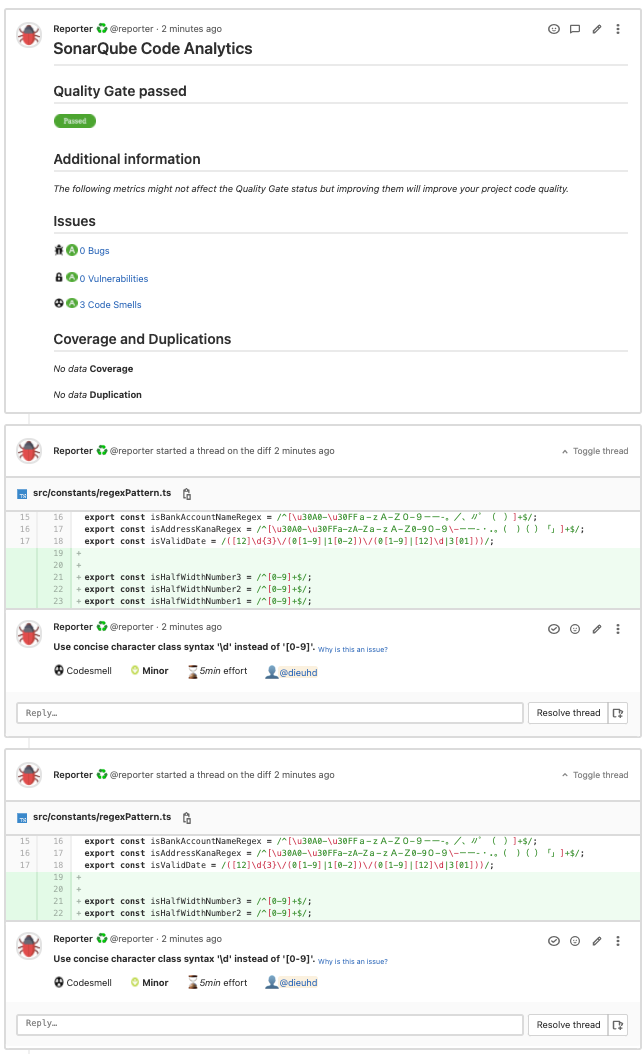sonar-quality-gate
ActionsTags
(2)Sonarqube have feature quality code gate, but it's not work for Community Edition. So, this plugin will be intergate to CI/CD, get quality code and push report to merge request when has change.
quality-gate is a command line interface for quality code gate.
- Analytics code: Use command
sonar-scannerto analytic code, report and push issues to sonar servers. - Push issue to code changes of merge request
- Generate report quality code of new code, and create note for merge request.
For Github and Gitlab
Result:
$ npm install -g sonar-quality-gate
# Show help
$ quality-gate --helpResult:
__ _ _ _ __ _ | | (_) | |_ _ _ __ _ __ _ | |_ ___
/ _` | | | | | / _` | | | | | | __| | | | | _____ / _` | / _` | | __| / _ \
| (_| | | |_| | | (_| | | | | | | |_ | |_| | |_____| | (_| | | (_| | | |_ | __/
\__, | \__,_| \__,_| |_| |_| \__| \__, | \__, | \__,_| \__| \___|
|_| |___/ |___/
Usage: quality-gate [options]
Global Options:
-h, --help [boolean]
-D, --define Define sonar property
Authentication:
sonar.login The authentication token or login of a SonarQube user with Execute Analysis permission on
the project.
More parameters:
- https://docs.sonarqube.org/latest/analysis/analysis-parameters/ [array]
--git Config git
--git.url Git server URL. Default: $GIT_URL
--git.token Git token. Default: $GIT_TOKEN
--git.project_id Gitlab project ID or Github repository. Default: $CI_PROJECt_ID or $GITHUB_REPOSITORY
--git.merge_id Git merge request IID. Default: $CI_MERGE_REQUEST_IID
[default: {}]
--sonar Config sonar
--sonar.url Sonarqube server URL. Default: $SONAR_URL or sonar.host.url in file
sonar-project.properties.
--sonar.token The authentication token of a SonarQube user with Execute Analysis permission on the
project. Default: $SONAR_TOKEN
--sonar.project_key Sonar project key. Default: sonar.projectKey in file sonar-project.properties
[default: {}]
-v, --version Show version [boolean]
-X, --debug Produce execution debug output [boolean] [default: false]
-p, --provide [default: "gitlab"]To run check quality code gate:
quality-gate -p=github -D sonar.login="<token>" --sonar.url="<sonar url>" --sonar.token="<sonar token>" --sonar.project_key="<sonar token>" --git.url="https://gitlab.com" --git.token="xxx" --git.project_id=123 --git.merge_id=345if set env for bellow parameters:
GIT_URL=""
GIT_TOKEN=""
CI_PROJECt_ID=""
CI_MERGE_REQUEST_IID=""
SONAR_URL=""
SONAR_TOKEN=""and has file sonar-project.properties:
sonar.host.url=
sonar.projectKey=
We can use short command:
quality-gate -Dsonar.login=""Add new file sonar-project.properties as below content:
# sonar.organization=dieuhd # if use sonarcloud, uncomment this line
sonar.host.url=[SONAR_HOST]
sonar.projectKey=[SONAR_PROJECT_KEY]
sonar.qualitygate.wait=true
Use quality-gate instead of sonar-scanner.
Example:
quality-gate -Dsonar.login=$SONAR_KEYAnd config for gitlab-ci:
stages:
- CheckSonar
.CheckSonarqube: &CheckSonarqube |
quality-gate -Dsonar.login=$SONAR_KEY
Sonar:
stage: CheckSonar
image: dieuhd/sonar-quality-gate
rules:
- if: '$CI_MERGE_REQUEST_TARGET_BRANCH_NAME == "master"'
script:
- *CheckSonarqubeP/S: Only work for merge request. Becase, the plugin need Merge Request IID.
Example:
name: Check sonarqube
on: [pull_request]
jobs:
build:
name: Build
runs-on: ubuntu-latest
steps:
- name: Checkout
uses: actions/[email protected]
with:
fetch-depth: 0 # Shallow clones should be disabled for a better relevancy of analysis
- name: Set up Sonar Quality Gate
uses: dieuhd/sonar-quality-gate@v1
env:
GITHUB_TOKEN: ${{ secrets.GITHUB_TOKEN }}
GIT_URL: "https://api.github.com"
GIT_TOKEN: ${{ secrets.GIT_TOKEN }}
SONAR_URL: ${{ secrets.SONAR_URL }}
SONAR_TOKEN: ${{ secrets.SONAR_TOKEN }}
SONAR_PROJECT_KEY: ${{ secrets.SONAR_PROJECT_KEY }}
with:
login: ${{ secrets.SONAR_TOKEN }}
url: ${{ secrets.SONAR_URL }}
projectKey: ${{ secrets.SONAR_PROJECT_KEY }}$ git clone https://github.com/dieuhd/sonar-quality-gate.git
$ cd sonar-quality-gate
$ npm install
$ husky install && chmod ug+x .husky/*
$ npm run start:devMIT. See LICENSE.txt.
sonar-quality-gate is not certified by GitHub. It is provided by a third-party and is governed by separate terms of service, privacy policy, and support documentation.
